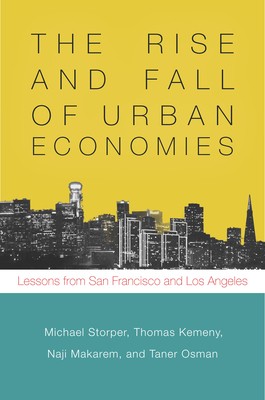
- We will send in 10–14 business days.
- Author: Michael Storper
- Publisher: STANFORD BUSINESS BOOKS
- Year: 2016
- Pages: 328
- ISBN-10: 1503600661
- ISBN-13: 9781503600669
- Format: 15 x 22.6 x 2 cm, minkšti viršeliai
- Language: English
- SAVE -10% with code: EXTRA
Reviews
Description
Today, the Bay Area is home to the most successful knowledge economy in America, while Los Angeles has fallen progressively further behind its neighbor to the north and a number of other American metropolises. Yet, in 1970, experts would have predicted that L.A. would outpace San Francisco in population, income, economic power, and influence. The usual factors used to explain urban growth--luck, immigration, local economic policies, and the pool of skilled labor--do not account for the contrast between the two cities and their fates. So what does?
The Rise and Fall of Urban Economies challenges many of the conventional notions about economic development and sheds new light on its workings. The authors argue that it is essential to understand the interactions of three major components--economic specialization, human capital formation, and institutional factors--to determine how well a regional economy will cope with new opportunities and challenges. Drawing on economics, sociology, political science, and geography, they argue that the economic development of metropolitan regions hinges on previously underexplored capacities for organizational change in firms, networks of people, and networks of leaders. By studying San Francisco and Los Angeles in unprecedented levels of depth, this book extracts lessons for the field of economic development studies and urban regions around the world.
EXTRA 10 % discount with code: EXTRA
The promotion ends in 22d.12:45:02
The discount code is valid when purchasing from 10 €. Discounts do not stack.
- Author: Michael Storper
- Publisher: STANFORD BUSINESS BOOKS
- Year: 2016
- Pages: 328
- ISBN-10: 1503600661
- ISBN-13: 9781503600669
- Format: 15 x 22.6 x 2 cm, minkšti viršeliai
- Language: English English
Today, the Bay Area is home to the most successful knowledge economy in America, while Los Angeles has fallen progressively further behind its neighbor to the north and a number of other American metropolises. Yet, in 1970, experts would have predicted that L.A. would outpace San Francisco in population, income, economic power, and influence. The usual factors used to explain urban growth--luck, immigration, local economic policies, and the pool of skilled labor--do not account for the contrast between the two cities and their fates. So what does?
The Rise and Fall of Urban Economies challenges many of the conventional notions about economic development and sheds new light on its workings. The authors argue that it is essential to understand the interactions of three major components--economic specialization, human capital formation, and institutional factors--to determine how well a regional economy will cope with new opportunities and challenges. Drawing on economics, sociology, political science, and geography, they argue that the economic development of metropolitan regions hinges on previously underexplored capacities for organizational change in firms, networks of people, and networks of leaders. By studying San Francisco and Los Angeles in unprecedented levels of depth, this book extracts lessons for the field of economic development studies and urban regions around the world.


Reviews